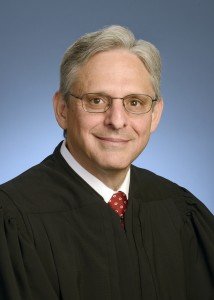A Mercy girl’s guide to the president’s SCOTUS nominee

President Obama named moderate Merrick Garland as his nomination for the Supreme the Court. (Photo credit: Fair Use)
After over a month of chaotic deliberation, in-depth research, and rampant speculation regarding who would become the next Supreme Court of the United States, the President has spoken. On March 9, President Obama announced that he was nominating Justice Merrick Garland, the chief judge of the U.S. Court of Appeals in the D.C. Circuit, to the Supreme Court.
As a high school student, you may wonder why this matters in your life. But, taking a closer look, you should realize that this man has the ability to influence the trajectory of our country, especially because of some of the upcoming Supreme Court cases regarding hot-topic issues like abortion.
Here are 10 things about Justice Garland and his beliefs that you, as a high school student, should be aware of:
1. He attended Harvard University, for both his undergraduate degree and for law school.
2. He is labeled as a moderate with liberally-inclined tendencies, but has been highly acclaimed by both Democrats and Republicans alike.
3. He is the Chief Justice of the U.S. Court of Appeals in the D.C. Circuit, which is widely considered by some to be the most direct route to the Supreme Court.
4. Justice Garland has far more judicial experience in comparison to any recent Supreme Court nominees.
5. If he’s confirmed, he is expected to give the liberal side of the Supreme Court a 5-4 majority for the first time in decades.
6. Justice Garland is married and has two daughters.
7. He is Jewish.
8. He managed the 1995 investigation into the Oklahoma City bombing, which at the time was the deadliest terrorist attack on U.S. soil. A year later, he was named to oversee the “Unabomber’’ inquiry following the 1996 arrest of Ted Kaczynski.
9. His opinion is considered inconspicuous on most hot-topic issues, as opposed to his predecessor, Justice Antonin Scalia.
10. He was the valedictorian of his high school class. According to president Obama, at his high school graduation, he ended up giving an impromptu speech about the importance of our 1st Amendment rights, after the salutatorian’s speech was cut short because it was bashed the United States’ involvement in the Vietnam War.
These facts aside, there is no guarantee that Justice Garland will be confirmed by the Senate to sit on the Supreme Court. There has been opposition to the President’s nomination both from conservative groups like the National Rifle Association and presidential candidate Donald Trump.
Republican senators have also said that they will not be considering President Obama’s nomination. They believe that a nomination should not be made until after the next presidential election, so that the people of the United States have a more direct way of influencing the future of the country.
For a presidential nominee to be confirmed, though, the Senate must approve the nomination. The Senate Judiciary Committee will hold hearings and personal questionings for nominees, while interest groups lobby senators to try and sway their decisions. After these events, the Committee will hold a vote deciding whether or not the nominee will make it to the full Senate. There, a final, simple majority vote must be achieved to determine the fate of the nominee.
Mrs. Richter’s fourth hour AP Government class watched President Obama announce his nomination of Justice Garland. Senior Arin Bell is very pleased with the President’s choice.
“I think [President Obama] did a great job,” she said. “I enjoy when presidents make moderate decisions, rather than going extremely left or extremely right.”
Senior Jillian Adolf, also in Mrs. Richter’s fourth hour, had an opinion on the matter as well.
“[President Obama’s] choice was surprising to me,” she said. “I thought he was going to nominate minority judge. Instead, he nominated a white male.”
